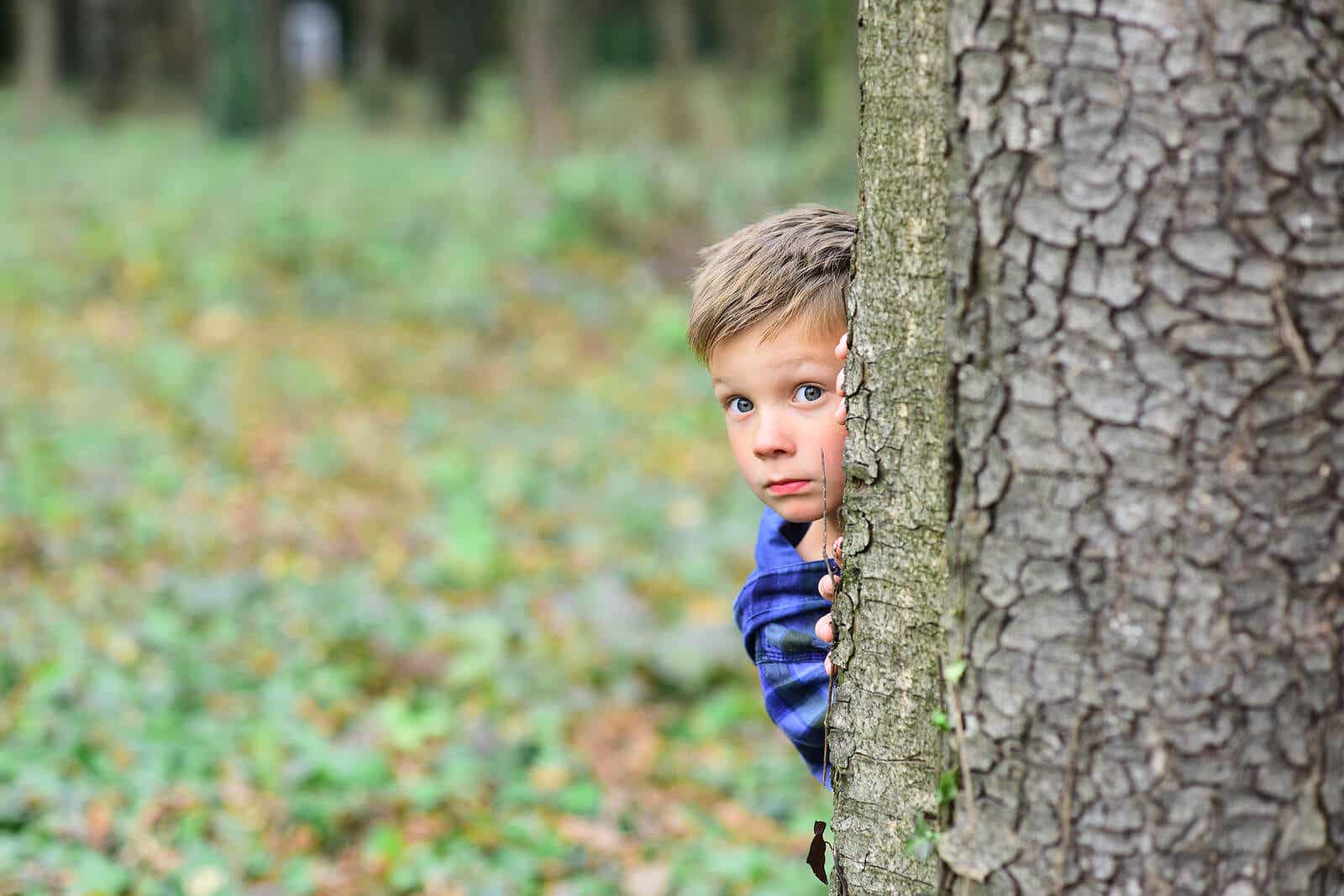6 Things to Do if Your Child Feels Afraid


Written and verified by the psychologist Mara Amor López
It’s common for children, especially when they’re younger, to be afraid. Whether it’s of the dark, going out in the street, or of strangers, there are many situations that can produce different fears in children. Here are some of the things you should do if your child feels afraid.
What’s essential in these cases is that parents help (with their own attitudes) to overcome their children’s fears. This includes respecting and, above all, understanding why they have these fears, and teaching them how to overcome them.
What should you do if your child feels afraid? How can you help them to overcome their fears? For these and other questions, you can find the answer below.
Things to do if your child is afraid
When your child feels afraid of something, someone, or some circumstance, as a parent, you can act according to these tips:

- It’s important to understand them and put yourself in their place. Here, you can tell him that fear, in some circumstances, is normal and even helpful. But sometimes that fear serves no purpose.
- Ask them why they’re afraid and what they’re afraid of. Also, explain to them the reasons why their fear is unsubstantiated.
- Explain to them and make them understand, by reasoning with them, that they’re out of danger, and that you’re always with him.
- Use breathing and relaxation techniques to teach them to calm down when they have an episode of fear.
- Always face fears together. For example, if they’re afraid of the dark, stay with them in the dark for a while, so that they can see that it’s okay to be in the dark. You should never prevent them from facing what they’re afraid of because it’s the only way to show them that their fears are unfounded.
What not to do if your child feels afraid
Most children feel fear, and this is inevitable. But, if as a parent, you give them support and patience, fear won’t be a problem for them. If children trust and have confidence in their parents, their help, and support, they’ll more easily solve their problem of fear. Some recommendations to help children overcome their fears are the following.
If your child expresses a fear of something, don’t laugh
If you make fun of or ridicule the child when they’re afraid, they’ll lose all confidence in you and that wouldn’t be positive for overcoming fears. Don’t use phrases such as: “Aren’t you ashamed of being so scared?” “You’re too old to be afraid!” Or “Don’t be silly, other children aren’t afraid!” If you use these phrases, your little one will stop telling you their fears but will continue to experience them just the same.
Don’t tell scary stories to frighten children
If you tell stories about monsters, ghosts, witches, vampires, and werewolves, especially before going to bed, your child will likely go to sleep with a feeling of fear. If they like these themes, tell them that these characters don’t exist in reality and that they’re only part of fairy tales.
Don’t force your child to go through situations they fear
Fears don’t end by facing them only once. Rather, it requires facing them progressively. It’s important for kids to get used to the situation they fear, gradually. If you force them to face it all at once, the only thing that can happen is that the fear will intensify.
Don’t ignore their fears or lie to them about them
Your child needs to have security and trust in the parents. That’s why you can’t tell him, for example, that a vaccine won’t hurt if they’re afraid of getting a shot. Without a doubt, it’ll hurt and, then, you’ll be contributing to their fear and also breaking their trust.

Never pass on your own fears to your children
If you’re afraid of a certain thing (spiders, mice, rats, etc.), you can pass it on to your child if they see how you act in front of those creatures. The way you deal with your fears will cause your child to follow the same pattern in those situations.
Don’t call them names
If they’re afraid of any situation, don’t call them names or tease them. That’ll only make the situation worse and make them feel insecure, alone, and misunderstood.
So, what should you do if your child feels afraid?
You already know some things to do if your child is afraid as well as what not to do. You may want to consider teaching your child about fear as a learning process from an early age. You can use stories about children overcoming their fears to read at night before bedtime, for example.
You shouldn’t avoid situations that produce fear, but neither should you force them to face them. If the fear is too paralyzing, it’s advisable to seek professional help.
It’s common for children, especially when they’re younger, to be afraid. Whether it’s of the dark, going out in the street, or of strangers, there are many situations that can produce different fears in children. Here are some of the things you should do if your child feels afraid.
What’s essential in these cases is that parents help (with their own attitudes) to overcome their children’s fears. This includes respecting and, above all, understanding why they have these fears, and teaching them how to overcome them.
What should you do if your child feels afraid? How can you help them to overcome their fears? For these and other questions, you can find the answer below.
Things to do if your child is afraid
When your child feels afraid of something, someone, or some circumstance, as a parent, you can act according to these tips:

- It’s important to understand them and put yourself in their place. Here, you can tell him that fear, in some circumstances, is normal and even helpful. But sometimes that fear serves no purpose.
- Ask them why they’re afraid and what they’re afraid of. Also, explain to them the reasons why their fear is unsubstantiated.
- Explain to them and make them understand, by reasoning with them, that they’re out of danger, and that you’re always with him.
- Use breathing and relaxation techniques to teach them to calm down when they have an episode of fear.
- Always face fears together. For example, if they’re afraid of the dark, stay with them in the dark for a while, so that they can see that it’s okay to be in the dark. You should never prevent them from facing what they’re afraid of because it’s the only way to show them that their fears are unfounded.
What not to do if your child feels afraid
Most children feel fear, and this is inevitable. But, if as a parent, you give them support and patience, fear won’t be a problem for them. If children trust and have confidence in their parents, their help, and support, they’ll more easily solve their problem of fear. Some recommendations to help children overcome their fears are the following.
If your child expresses a fear of something, don’t laugh
If you make fun of or ridicule the child when they’re afraid, they’ll lose all confidence in you and that wouldn’t be positive for overcoming fears. Don’t use phrases such as: “Aren’t you ashamed of being so scared?” “You’re too old to be afraid!” Or “Don’t be silly, other children aren’t afraid!” If you use these phrases, your little one will stop telling you their fears but will continue to experience them just the same.
Don’t tell scary stories to frighten children
If you tell stories about monsters, ghosts, witches, vampires, and werewolves, especially before going to bed, your child will likely go to sleep with a feeling of fear. If they like these themes, tell them that these characters don’t exist in reality and that they’re only part of fairy tales.
Don’t force your child to go through situations they fear
Fears don’t end by facing them only once. Rather, it requires facing them progressively. It’s important for kids to get used to the situation they fear, gradually. If you force them to face it all at once, the only thing that can happen is that the fear will intensify.
Don’t ignore their fears or lie to them about them
Your child needs to have security and trust in the parents. That’s why you can’t tell him, for example, that a vaccine won’t hurt if they’re afraid of getting a shot. Without a doubt, it’ll hurt and, then, you’ll be contributing to their fear and also breaking their trust.

Never pass on your own fears to your children
If you’re afraid of a certain thing (spiders, mice, rats, etc.), you can pass it on to your child if they see how you act in front of those creatures. The way you deal with your fears will cause your child to follow the same pattern in those situations.
Don’t call them names
If they’re afraid of any situation, don’t call them names or tease them. That’ll only make the situation worse and make them feel insecure, alone, and misunderstood.
So, what should you do if your child feels afraid?
You already know some things to do if your child is afraid as well as what not to do. You may want to consider teaching your child about fear as a learning process from an early age. You can use stories about children overcoming their fears to read at night before bedtime, for example.
You shouldn’t avoid situations that produce fear, but neither should you force them to face them. If the fear is too paralyzing, it’s advisable to seek professional help.
This text is provided for informational purposes only and does not replace consultation with a professional. If in doubt, consult your specialist.








